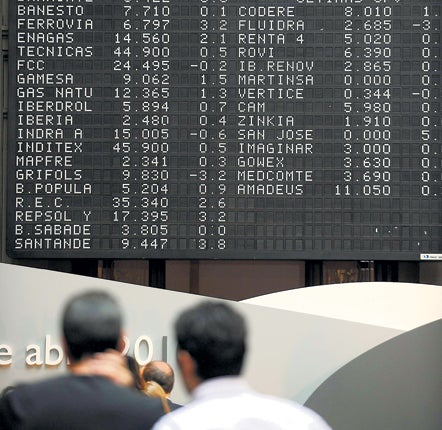As size of Greek bailout soars, supply of German sympathy runs short
Possible tripling of contribution provokes anger on streets

Your support helps us to tell the story
From reproductive rights to climate change to Big Tech, The Independent is on the ground when the story is developing. Whether it's investigating the financials of Elon Musk's pro-Trump PAC or producing our latest documentary, 'The A Word', which shines a light on the American women fighting for reproductive rights, we know how important it is to parse out the facts from the messaging.
At such a critical moment in US history, we need reporters on the ground. Your donation allows us to keep sending journalists to speak to both sides of the story.
The Independent is trusted by Americans across the entire political spectrum. And unlike many other quality news outlets, we choose not to lock Americans out of our reporting and analysis with paywalls. We believe quality journalism should be available to everyone, paid for by those who can afford it.
Your support makes all the difference.The screaming headline on the front page of Germany's mass circulation newspaper Bild seemed to say it all yesterday. "The Greeks want even more billions from us! – 25,000,000,000 Euro !" it howled.
It was the paper's predictably apoplectic response to new and politically alarming estimates which confirm that if Germany is to bail out Athens, it will have to put three times the amount of money on the table than the sum that was being discussed only days ago.
"Suddenly our politicians have got billions of euros for Greece. It is a country that has been living beyond its means for decades. It cheated to get the euro and well and truly lied to the rest of Europe. Congratulations Dear German Government!" Bild added in a sarcastic editorial.
Instead of the €8.4bn (£7.3bn) that was being talked about as Germany's contribution to a joint EU and IMF rescue package, the new sum being bandied about yesterday was a staggering €25bn over three years. The figure was leaked from an emergency meeting between Chancellor Angela Merkel, the IMF's Dominique Strauss-Kahn and the European Central Bank's Jean-Claude Trichet in Berlin on Wednesday – less than 12 hours after the Greek debt crisis exploded again and the ramifications for the euro itself suddenly became glaringly apparent.
Opinion polls show that 90 per cent of German voters are strongly against the country contributing to a Greek bailout. But Germans also feel they have been cheated and their politicians are naturally perplexed.
Europe had grown used to a docile Germany that wanted to be European more than anything else. It was once a Germany that was willing to pay for its new European identity through cheque book diplomacy. It was the driving force behind the single currency and yet one of its most agreeable effects was that in exchange for huge budgetary transfers to the poorest member states, Germany gained a huge single market with common trading rules for its exports.
But suddenly the euro and Europe as a whole seems to have turned on Germany. It seems that history is never far behind when it comes to today's Germany. Helmut Kohl, Angela Merkel's mentor and predecessor as conservative chancellor, was perhaps more responsible for the euro than anyone else. He coined the phrase "German unity and European unity are two sides of the same coin." The coin turned out to be the euro.
Mr Kohl managed to lull Germany's reluctant voters – unwilling to give up their mighty Deutsche Marks – into accepting the new currency as the price for unity. They were never asked to vote on the new currency in a referendum. Instead they allowed themselves to be fobbed off with Mr Kohl's high-minded promises that the euro was a guarantee against future wars in Europe.
With German exports booming and the German-inspired deficit criteria of the Maastricht Treaty in place, the euro seemed like a roaring success story. But that was before the global financial crisis and Greece. Now the Germans feel they have been conned and their fury has caused their leaders – notably Ms Merkel to prevaricate. The German Chancellor faces a key regional election, which could decide her government's future in a week's time. She has offered to contribute to a Greek bailout, but in order to sweeten the pill for voters, she has stressed that it would be as a last resort and that Greece will have to accept tough conditions if help is to be forthcoming.
Her reluctance to commit German money to Greece from the word go has since been cited a main reason why the Athens debt crisis dramatically accelerated over the past few days with the risk of other poor eurozone members being infected. Ms Merkel has now been hoisted by her own petard.
Pressure from the IMF and the rest of Europe have finally forced Ms Merkel into the realisation that Germany has to contribute to a Greek bailout if the euro is not to go down in history as a failure and take the contintent's economies with it. And she must now sell this prospect to a reluctant electorate.
Join our commenting forum
Join thought-provoking conversations, follow other Independent readers and see their replies
Comments